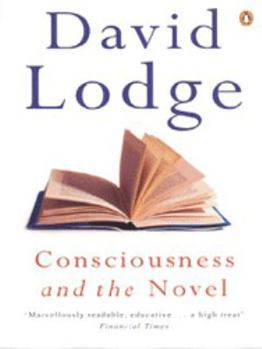Consciousness and the Novel
Select Format
Select Condition 
Book Overview
Human consciousness, long the province of literature, has lately come in for a remapping--even rediscovery--by the natural sciences, driven by developments in Artificial Intelligence, neuroscience,... This description may be from another edition of this product.
Format:Paperback
Language:English
ISBN:0141011246
ISBN13:9780141011240
Release Date:January 2003
Publisher:Penguin Books
Length:336 Pages
Weight:0.55 lbs.
Dimensions:7.8" x 0.9" x 5.1"
Customer Reviews
1 rating
Reads clearly, like a guide to the process of reading and the craft of writing
Published by Thriftbooks.com User , 15 years ago
If you are a reader (or a writer) looking for a clearly written book that will show you the reasons why the human mind--our inner thoughts--are both knowable and the subject of literary fiction, this book is it. In this collection of David Lodge's essays--many of them were public presentations--Lodge shows why or how novels which portray the human condition are also spiritual and social explorations of life. For Lodge, the study of literature--and the writing of it--should be a humane and compassionate exploration of how people behave under pressure. While it helps if you have read the novels Lodge discusses--by Henry James, E. M. Forster, and Philip Roth--I'm convinced that the notions of human consciousness or "character development" which he explains can be applied to novels by anyone, say, from Native American fiction, to work written by former gang members. The personal growth of an individual "character" is often the narrative arc and plot of a novel. Lodge's view of literature should be studied for information about the craft of writing as well as about life itself. In Chapter 1, Lodge covers topics which should become familiar to all readers: 19th-century and early 20th-century novelists were trying to present the individual in relation to society and social change. These writers had to develop literary techniques that would show this, that is, novelists had to develop methods of writing that would show how people could be written about in ways differing from journalism and sociology. The modern novel was born as soon as 20th-century writers developed "free indirect speech," "interior monologue," or flow of thought. But also, with this notion--that individuals could know themselves--the modern mind was born. The possibility of a character's self-knowledge is signaled in phrases such as "She asked herself," indicating that in the course of the novel the character will demonstrate her or his level of consciousness. In Chapter 2, Lodge covers the reading process, what we do when we read. Clearly, reading is an intimate activity in which we engage our own minds. But a novel is also public. Is a novel less likely to be criticized if it is a "good read"--easy to consume--than if the novel presents complex ideas? Lodge suggests that even a complex novel can entertain if the reader knows his or her personal reading process. Lodge's work as a novelist, university professor, and public speaker enable him to explain all this. There are eleven essays in all--all worth studying--and a half dozen alone are worth the price of the book. For example, the chapter on how Henry James's complex novels have been turned into award-winning films is both about literature and the film-making process. Lodge writes that the kind of intimate consciousness that James novelized, "self-consciousness," is "precisely what film as a medium finds most difficult to represent, because it is not visible" (202-03). Similarly, the chapter on E. M. Forster's n





